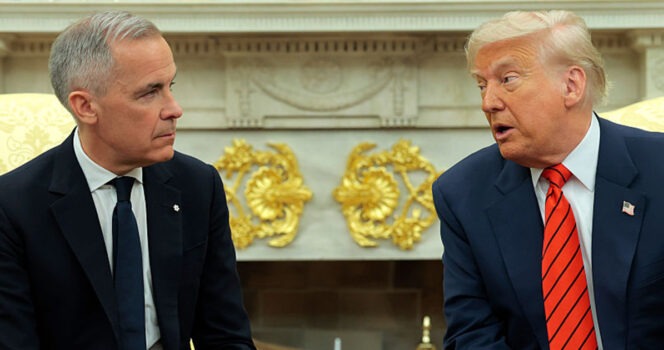In late June 2025, Canada enacted a 3% Digital Services Tax (DST) aimed at capturing revenue from major tech firms—like Amazon, Google, Meta, Uber, and Airbnb—if they generated over CAD 20 million (~USD 14.6 million) from Canadian users and had global revenues exceeding €750 million. Unusually, the tax had a retroactive clause, covering earnings from January 2022. The Canadian DST was designed to ensure large digital companies contribute tax in markets they serve, especially where traditional corporate tax rules lag behind digital economies.

Trump Brands It a “Blatant Attack”
Former U.S. President Donald Trump took to Truth Social on June 27, condemning Canada’s DST as “a direct and blatant attack on our Country,” and threatened to end trade talks immediately. Trump announced the U.S. would terminate all trade negotiations and hinted at retaliatory tariffs to pressure Canada.
The timing was dramatic—the first tax payments were scheduled for June 30, 2025, potentially generating nearly USD 2–3 billion and adversely impacting U.S. tech companies.

Canadian Pushback and Economic Stakes
Canada pushed the DST through Parliament in June 2024, supported by projections of CAD 7.2 billion (~USD 5.3 billion) in revenue over five years. It also aligned with similar taxes in France, the UK, Austria, Spain, and Turkey.
However, the tax drew criticism for its retroactive implementation, which the U.S. Treasury described as “patently unfair.” Industry groups warned of its potential to disrupt transborder digital services and global supply chains.
Canada Backs Down to Avoid Crisis
Within days of the Trump threat, Canada’s Finance Minister François‑Philippe Champagne announced the DST would be rescinded ahead of its first payment deadline. Legislation to repeal it formally would follow.
Prime Minister Mark Carney confirmed the decision was intended to restart trade negotiations by the G7-set target of July 21, 2025. His statement emphasized Canada’s focus on achieving a trade deal beneficial for its workers and businesses.

Trade Talks Resume, Pressures Remain
Immediately after the withdrawal, Carney and Trump held a phone call, and trade talks were restarted with a July 21 deadline. White House press secretary labeled Canada’s reversal as capitulation, and Trump economic adviser Kevin Hassett signaled that similar DSTs in other countries might face action.
The U.S. Chamber of Commerce, along with the Canadian Business Council, supported Canada’s decision as key to preserving the economic relationship.
Reaction from Economists and Observers
Economist Joseph E. Stiglitz criticized Canada’s move, calling it necessary for tax fairness but lamented that Canada yielding under U.S. pressure undermines sovereignty and sets a poor precedent. Other analysts pointed out that while an OECD-led multilateral solution was ideal, the lack of U.S. support made unilateral DSTs vulnerable to retaliation.

Why the DST Was Contentious
The DST targeted situations where digital enterprises benefited from Canadian users without physical presence or tax liability under existing treaties. However, because it taxed gross revenue and was retroactive, it raised concerns about predictability and fairness.
The U.S. and tech industry argued that such taxes functioned like tariffs and violated the USMCA (United States–Mexico–Canada Agreement). The U.S. considered remedies including Section 301 investigation into Canada’s DST.
Broader Implications
This episode highlights ongoing international tension over the digital economy and taxation. Multiple countries remain divided between pursuing national DSTs and waiting for global frameworks like OECD’s Pillar One to distribute taxing rights equitably.
For now, Canada’s retreat underscores the economic leverage the U.S. holds over bilateral trade partners. The fate of other DSTs—including those in the UK, France, and EU—remains uncertain in face of U.S. diplomatic and economic pressure.
Outlook: Negotiations Ahead
As both nations fast-track trade discussions before the July 21 deadline, the main sticking point remains how to address digital-era taxation without triggering disputes. Canada’s reversal may have eased immediate tensions, but establishing long-term stability in cross-border digital policy will require durable multilateral cooperation.
Sources
-
Government of Canada – Statement on rescinding DST
-
DW – Canada-US digital tax trade tensions
-
CNBC – Canada rescinds tax after Trump threats
-
Al Jazeera – Trump halts negotiations over digital tax
-
The Guardian – Stiglitz critique of Canada’s reversal
-
Business Insider – Financial cost of DST to tech firms
-
Associated Press – Trade talks resume after tax withdrawal
-
Wikipedia – Canada Digital Services Tax Act Overview

